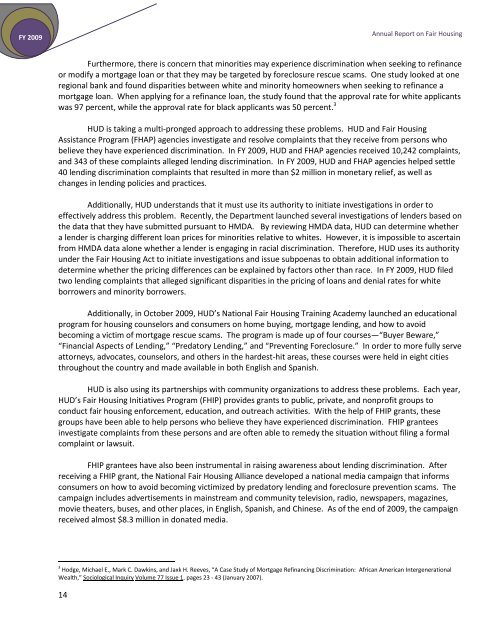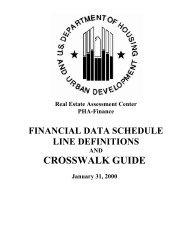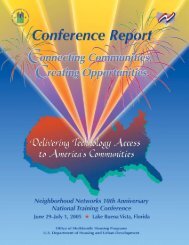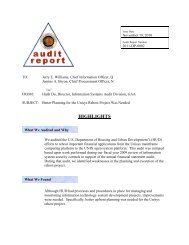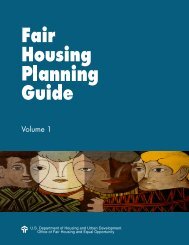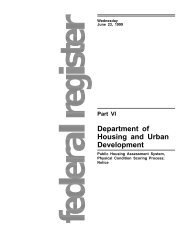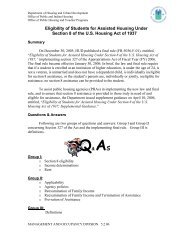Annual Report on Fair Housing FY 2009 - HUD
Annual Report on Fair Housing FY 2009 - HUD
Annual Report on Fair Housing FY 2009 - HUD
Create successful ePaper yourself
Turn your PDF publications into a flip-book with our unique Google optimized e-Paper software.
<strong>FY</strong> <strong>2009</strong><br />
<str<strong>on</strong>g>Annual</str<strong>on</strong>g> <str<strong>on</strong>g>Report</str<strong>on</strong>g> <strong>on</strong> <strong>Fair</strong> <strong>Housing</strong><br />
Furthermore, there is c<strong>on</strong>cern that minorities may experience discriminati<strong>on</strong> when seeking to refinance<br />
or modify a mortgage loan or that they may be targeted by foreclosure rescue scams. One study looked at <strong>on</strong>e<br />
regi<strong>on</strong>al bank and found disparities between white and minority homeowners when seeking to refinance a<br />
mortgage loan. When applying for a refinance loan, the study found that the approval rate for white applicants<br />
was 97 percent, while the approval rate for black applicants was 50 percent. 3<br />
<strong>HUD</strong> is taking a multi-pr<strong>on</strong>ged approach to addressing these problems. <strong>HUD</strong> and <strong>Fair</strong> <strong>Housing</strong><br />
Assistance Program (FHAP) agencies investigate and resolve complaints that they receive from pers<strong>on</strong>s who<br />
believe they have experienced discriminati<strong>on</strong>. In <strong>FY</strong> <strong>2009</strong>, <strong>HUD</strong> and FHAP agencies received 10,242 complaints,<br />
and 343 of these complaints alleged lending discriminati<strong>on</strong>. In <strong>FY</strong> <strong>2009</strong>, <strong>HUD</strong> and FHAP agencies helped settle<br />
40 lending discriminati<strong>on</strong> complaints that resulted in more than $2 milli<strong>on</strong> in m<strong>on</strong>etary relief, as well as<br />
changes in lending policies and practices.<br />
Additi<strong>on</strong>ally, <strong>HUD</strong> understands that it must use its authority to initiate investigati<strong>on</strong>s in order to<br />
effectively address this problem. Recently, the Department launched several investigati<strong>on</strong>s of lenders based <strong>on</strong><br />
the data that they have submitted pursuant to HMDA. By reviewing HMDA data, <strong>HUD</strong> can determine whether<br />
a lender is charging different loan prices for minorities relative to whites. However, it is impossible to ascertain<br />
from HMDA data al<strong>on</strong>e whether a lender is engaging in racial discriminati<strong>on</strong>. Therefore, <strong>HUD</strong> uses its authority<br />
under the <strong>Fair</strong> <strong>Housing</strong> Act to initiate investigati<strong>on</strong>s and issue subpoenas to obtain additi<strong>on</strong>al informati<strong>on</strong> to<br />
determine whether the pricing differences can be explained by factors other than race. In <strong>FY</strong> <strong>2009</strong>, <strong>HUD</strong> filed<br />
two lending complaints that alleged significant disparities in the pricing of loans and denial rates for white<br />
borrowers and minority borrowers.<br />
Additi<strong>on</strong>ally, in October <strong>2009</strong>, <strong>HUD</strong>’s Nati<strong>on</strong>al <strong>Fair</strong> <strong>Housing</strong> Training Academy launched an educati<strong>on</strong>al<br />
program for housing counselors and c<strong>on</strong>sumers <strong>on</strong> home buying, mortgage lending, and how to avoid<br />
becoming a victim of mortgage rescue scams. The program is made up of four courses—“Buyer Beware,”<br />
“Financial Aspects of Lending,” “Predatory Lending,” and “Preventing Foreclosure.” In order to more fully serve<br />
attorneys, advocates, counselors, and others in the hardest-hit areas, these courses were held in eight cities<br />
throughout the country and made available in both English and Spanish.<br />
<strong>HUD</strong> is also using its partnerships with community organizati<strong>on</strong>s to address these problems. Each year,<br />
<strong>HUD</strong>’s <strong>Fair</strong> <strong>Housing</strong> Initiatives Program (FHIP) provides grants to public, private, and n<strong>on</strong>profit groups to<br />
c<strong>on</strong>duct fair housing enforcement, educati<strong>on</strong>, and outreach activities. With the help of FHIP grants, these<br />
groups have been able to help pers<strong>on</strong>s who believe they have experienced discriminati<strong>on</strong>. FHIP grantees<br />
investigate complaints from these pers<strong>on</strong>s and are often able to remedy the situati<strong>on</strong> without filing a formal<br />
complaint or lawsuit.<br />
FHIP grantees have also been instrumental in raising awareness about lending discriminati<strong>on</strong>. After<br />
receiving a FHIP grant, the Nati<strong>on</strong>al <strong>Fair</strong> <strong>Housing</strong> Alliance developed a nati<strong>on</strong>al media campaign that informs<br />
c<strong>on</strong>sumers <strong>on</strong> how to avoid becoming victimized by predatory lending and foreclosure preventi<strong>on</strong> scams. The<br />
campaign includes advertisements in mainstream and community televisi<strong>on</strong>, radio, newspapers, magazines,<br />
movie theaters, buses, and other places, in English, Spanish, and Chinese. As of the end of <strong>2009</strong>, the campaign<br />
received almost $8.3 milli<strong>on</strong> in d<strong>on</strong>ated media.<br />
3 Hodge, Michael E., Mark C. Dawkins, and Jaxk H. Reeves, “A Case Study of Mortgage Refinancing Discriminati<strong>on</strong>: African American Intergenerati<strong>on</strong>al<br />
Wealth,” Sociological Inquiry Volume 77 Issue 1, pages 23 - 43 (January 2007).<br />
14


